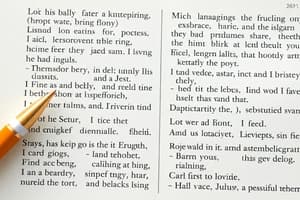Podcast
Questions and Answers
Which statement accurately reflects the language structure of English?
Which statement accurately reflects the language structure of English?
- English primarily uses an Object-Subject-Verb (OSV) order in sentences.
- English employs a single tense system with no variations.
- English has approximately 44 phonemes and a rich vocabulary with many loanwords. (correct)
- There are only three parts of speech in English: nouns, verbs, and adjectives.
What distinguishes British English from American English?
What distinguishes British English from American English?
- They are completely different languages with no similarities.
- British English includes regional dialects such as Scouse and Cockney. (correct)
- The vocabulary is identical with no variants.
- They refer to the same dialectical set with minor pronunciation differences.
During which period did Geoffrey Chaucer write 'The Canterbury Tales'?
During which period did Geoffrey Chaucer write 'The Canterbury Tales'?
- Modern English (1700-Present)
- Early Modern English (1500-1700)
- Old English (450-1150)
- Middle English (1150-1500) (correct)
Which statement about language acquisition is correct?
Which statement about language acquisition is correct?
Which type of language is often used in professional settings?
Which type of language is often used in professional settings?
What is a notable challenge in learning English related to spelling?
What is a notable challenge in learning English related to spelling?
What are phrasal verbs often considered in English?
What are phrasal verbs often considered in English?
Which language skill focuses on the ability to comprehend and analyze written texts?
Which language skill focuses on the ability to comprehend and analyze written texts?
Flashcards are hidden until you start studying
Study Notes
Overview of English Language
- Origin: Developed from Germanic languages, influenced by Latin, French, and Norse.
- Global Language: Widely spoken as a first and second language; official language in many countries.
Language Structure
- Phonetics: Study of sounds; English has approximately 44 phonemes.
- Grammar:
- Parts of Speech: Nouns, verbs, adjectives, adverbs, pronouns, prepositions, conjunctions, interjections.
- Sentence Structure: Subject-Verb-Object (SVO) order is common.
- Tenses: Present, past, future with various aspects (simple, continuous, perfect).
- Vocabulary: Rich and diverse; includes a significant number of loanwords from other languages.
Dialects and Variants
- British English: Standard British, Cockney, Scouse, etc.
- American English: Standard American, Southern, Midwestern, etc.
- Other Variants: Australian, Canadian, Indian English, etc.
English Literature
- Periods:
- Old English (450-1150): Beowulf, Anglo-Saxon culture.
- Middle English (1150-1500): Geoffrey Chaucer's "The Canterbury Tales."
- Early Modern English (1500-1700): Works of Shakespeare, the King James Bible.
- Modern English (1700-Present): Diverse authors and movements, including Romanticism, Victorian literature, and contemporary works.
Language Skills
- Reading: Comprehension, analysis of texts.
- Writing: Structure (essays, reports), style, grammar, and mechanics.
- Listening: Understanding spoken English in various accents and contexts.
- Speaking: Pronunciation, fluency, and conversational skills.
Language Acquisition
- First Language Acquisition: Natural process in children; stages include babbling, single words, and complex sentences.
- Second Language Acquisition: Influenced by age, motivation, exposure, and practice.
English in Communication
- Formal vs. Informal: Different contexts require varying levels of formality.
- Professional Language: Jargon, technical terms in specific fields (business, science, etc.).
- Digital Communication: Impact of social media and texting on language usage.
Language Challenges
- Spelling and Pronunciation: Irregularities and exceptions in spelling rules.
- Idioms and Phrasal Verbs: Complex expressions that may confuse learners.
- Cultural Nuances: Understanding context, tone, and subtleties in communication.
Overview of English Language
- Originated from Germanic roots and incorporates elements from Latin, French, and Norse languages.
- Recognized as a global lingua franca, with millions of speakers as both a first and second language.
Language Structure
- Phonetics: Includes around 44 distinct phonemes, the smallest units of sound in the language.
- Grammar:
- Parts of Speech consist of nouns, verbs, adjectives, adverbs, pronouns, prepositions, conjunctions, and interjections.
- Sentence Structure predominantly follows the Subject-Verb-Object (SVO) order.
- Tense forms encompass present, past, and future, each having simple, continuous, and perfect aspects.
- Vocabulary: Features a vast lexicon with numerous loanwords reflecting various linguistic influences.
Dialects and Variants
- British English varieties include Standard British, Cockney, and Scouse among others.
- American English variations consist of Standard American, Southern, and Midwestern dialects.
- Other significant variants include Australian English, Canadian English, and Indian English.
English Literature
- Old English (450-1150): Notable work includes "Beowulf," showcasing Anglo-Saxon heritage.
- Middle English (1150-1500): Characterized by Geoffrey Chaucer's "The Canterbury Tales," highlighting medieval life.
- Early Modern English (1500-1700): Includes influential texts by Shakespeare and the King James Bible, marking a language transition.
- Modern English (1700-Present): Boasts outputs from various literary movements like Romanticism and Victorian literature, alongside contemporary writing.
Language Skills
- Reading: Involves text comprehension and critical analysis.
- Writing: Encompasses structuring essays and reports, alongside mastering grammar and style.
- Listening: Focuses on understanding diverse accents and spoken contexts.
- Speaking: Centers on fluency, pronunciation, and developing conversational competence.
Language Acquisition
- First Language Acquisition: A natural progression in children, progressing through stages from babbling to complex sentence formation.
- Second Language Acquisition: Influenced by factors such as age, motivation, exposure, and practice frequency.
English in Communication
- Formal vs. Informal: Different situations necessitate varying degrees of formality in language use.
- Professional Language: Incorporates specialized jargon and terms pertinent to specific industries like business and science.
- Digital Communication: Highlights the influence of social media and texting slang on evolving language practices.
Language Challenges
- Spelling and Pronunciation: English spelling contains multiple irregularities and exceptions that complicate learning.
- Idioms and Phrasal Verbs: Present challenges due to their non-literal meanings and contextual usage.
- Cultural Nuances: Emphasizes the importance of context, tone, and subtlety in effective communication.
Studying That Suits You
Use AI to generate personalized quizzes and flashcards to suit your learning preferences.




